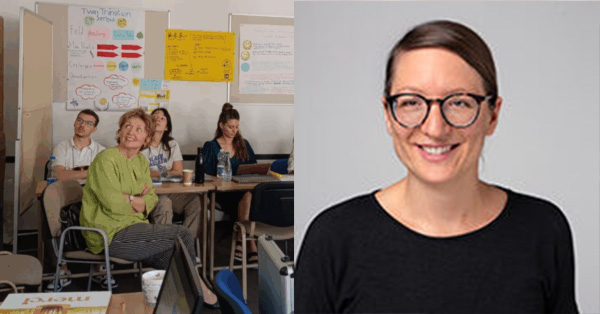The twin transition describes the shift towards a more sustainable and digital future. Adult education plays an important role in this, which the international ALE4TT project aims to strengthen. Project manager Marianne Müller provides information in an interview with EPALE, the platform for adult education in Europe.
Interview: Gabriele Müller (EPALE)
The ALE4TT project supports adult learning and education (ALE) organisations in highlighting the central importance of adult education in the twin transition (TT) and anchoring it in policy. Adult education plays a key role in empowering people for digital developments and sustainable action. Adult education should and can combine digital and sustainable skills, thereby contributing to a fairer transition.
Marianne Müller is Project Manager for Research and International Affairs at SVEB and reports on the Advocacy for Twin Transition (ALE4TT) project.
Who launched ALE4TT and who supports it?
The ALE4TT – Advocacy for Twin Transition project was initiated by the Swiss Association for Continuing Education. SVEB supports continuing education organisations and professionals with practical assistance, information and at the political level. Its partners are the European Association for Adult Learning (EAEA) and the International Council for Adult Education (ICAE). The project was designed and implemented jointly. It is funded by Movetia, the national agency for the promotion of exchange and mobility in education in Switzerland.
So it’s not just a Swiss project. Was that the plan from the outset?
Yes, the project was conceived as an international project from the outset. Twin transition is a global issue that we need to discuss across borders. That is why ALE4TT thrives on international exchange with input and best practices from continuing education stakeholders in Europe and around the world. Various best practices were mentioned in the training sessions. One example is the Maroc Digital 2025/2030 programme, in which the Moroccan government is actively promoting digitalisation to improve public services, promote digital participation and reduce social inequalities. In Switzerland, there is the Lifelong Learning Programme, which enables targeted digital training for employees through close cooperation between the state and industry by means of joint financing. And a case study from Uganda showed how knowledge about sustainable agriculture is being integrated into adult education to strengthen rural households with sustainable farming methods, increase productivity and reduce poverty.
Adult education and the twin transition – what are the links?
The twin transition describes the transformation of complex systems – consisting of social, technological and ecological components – towards a more sustainable and digital future. Adult education plays a central role in this as a driver of individual and societal change. Adults need the right knowledge, skills and competences to be able to participate in the digital and green transition. Adults must be empowered to actively shape the twin transition. There are various examples of this. Very mundane examples include digital skills for using public transport or knowledge of renewable energies, energy-efficient processes and sustainable production techniques.
ALE4TT ends this year. What goals have you achieved?
The overall goal of ALE4TT is to strengthen the role of continuing education in the digital and green transition – in Switzerland, in Europe and globally. Advocacy measures are needed to strengthen continuing education in this field. Against this backdrop, the project first used participatory methods to design a training programme that imparts knowledge and skills relating to political processes and tools for representing interests. Building on this, a toolbox is being developed that will be available to all interested parties. The training programme was held in Belgrade in May 2024 and in Brussels in May 2025 with international groups of twelve participants from nine different countries. The participants were continuing education stakeholders with experience in interest representation. In addition to theoretical input, the courses included joint exchanges of best practices and the development of action plans.
What were the two training courses about?
The first training course in Belgrade focused on the basics of the digital and green transition. Building on this, the training course in Brussels focused on advocacy measures to strengthen the role of continuing education in the twin transition. During the three-day training course in Belgrade, we made a study visit to the Kolubara Mine Site and saw the impact of the coal industry on the ground, but also learned about digital tools for dealing with change and knowledge transfer. In Brussels, a particular highlight was the study visit to the BeCentral Campus, a centre for digital education in Brussels. There, participants learned about innovative approaches, such as the use of AI to assess environmental impacts at the FARI Institute and inclusive training opportunities at Orange FabLab. These examples impressively demonstrated how digitalisation and sustainability can work together – and the role that adult education plays in this.
Can you tell us more about the ALE4TT toolkit? Is it accessible to everyone working in adult education?
Yes, the toolbox is open to anyone interested. It offers a wealth of information on adult education in the context of the twin transition. It begins with an introduction and contains videos and materials on the green and digital transformation. It also offers publications on didactic and methodological approaches, including projective methods, the implementation of open space formats and participatory planning approaches. For more in-depth exploration, practical resources such as links to further e-learning opportunities – such as an online course on just transition – and the Beyond Learning podcast are available. The toolbox also contains presentations and good practices from the training courses in Belgrade and Brussels. Finally, there are recommendations for practice, research and policy, which were also developed during the training courses.

